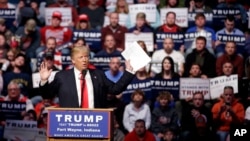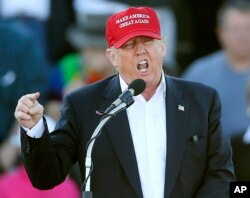The Chinese public has reacted to U.S. presidential contender Donald Trump’s latest controversial remarks with bitter sarcasm, one day after the real-estate tycoon compared the American trade deficit with China to rape.
Trump on Sunday told a cheering crowd in Fort Wayne, Indiana that “we can’t continue to allow China to rape our country,” referring to the lopsided trade balance in China’s favor.
That marked the first time in the U.S. campaign that the Republican front-runner has used the term “rape” to describe, in his view, China’s trade dominance over the U.S., although he used the same analogy as early as 2011 to accuse China of trade and currency manipulation.
The Chinese government hasn’t given an official response to Trump’s renewed criticism.
But that hasn’t deterred a number of Chinese netizens from attacking Trump with, mostly, sarcasm.
Equally bitter words
One Weibo user further called Trump “a big mouth, [who aims at] boosting online popularity” while another user wrote “the analogy of rape is inappropriate. Instead, the expression that [China is] liberating the U.S. is more like it,” followed by three emojis of smiley faces.
A blogger nicknamed Kafka’s Diary expressed concerns over Trump’s remarks by commenting that “Trump’s claims of isolationism will be in favor of Chinese authorities, but detrimental to Chinese people” because such policies will create barriers to China’s U.S.-bound exports, which will end up hurting domestic businesses and cost Chinese people jobs.
“But Chinese authorities may secretly give a helping hand to Trump’s campaign as they welcome his stance of staying out of the country’s human rights record,” the blogger added.
One Weibo user, moreover, compared Trump to former German dictator Adolf Hitler, mockingly writing “shall Trump be elected, the U.S. will become an even more powerful country.”
No official rebuttal
Compared to heated online comments, Chinese authorities seem muted on the controversy at a time when the country is on a seven-day national holiday.
The local media had previously labelled Trump as a populist, whose sensational rhetoric only aimed to garner media attention.
No Chinese officials Tuesday discussed Trump’s undiplomatic analogy to U.S.-China trade ties. The issue was also absent from editorials in state-run media, including Xinhua News, People’s Daily and Global Times.
Only the state-controlled Wen Wei Po in Hong Kong, in its editorial, explained the rationale behind what it calls the “Trump phenomena,” saying it has reflected the U.S. society’s pervasive resentment toward the country’s upper classes, including those who are in power and financially advantaged.
The Trump phenomena will widen the divide within the U.S. Republican Party, which may end up hurting its own prospects of claiming a presidential win, the editorial added.
Campaign tricks?
Zhu Feng, professor of international studies at Peking University, urged Trump to refrain from using what he calls dramatic and inflammatory campaign language.
“I think it’s a very distorted perception, [sent] out by the presidential candidate. It’s not just exaggeration, it’s also very inflammatory,” Zhu said.
The professor rejected the view that many in China are looking at Trump as a joke since the presidential hopeful has been a very successful businessman, who should be aware that the trade imbalance between the two countries was a result of the globalization and the division of labor and economic advantages.
While it is interesting to see how the polarization presented during the presidential campaign will play out, the professor expressed worries over how Trump’s comments will impact his country’s economic future with the U.S. at a time when China is excluded from the U.S.-led Trans-Pacific Partnership (TPP) discussions.
“We’re highly aware of Donald Trump’s inward-looking [views] and ideas. We don’t think it will be very helpful for the economic integration between Washington and Beijing,” he added.





